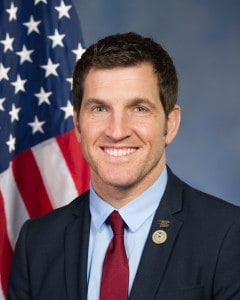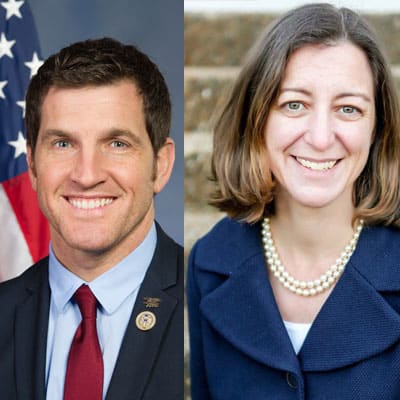Hannah Mancoll and Sam Zelenka, students at First Colonial’s Legal Studies Academy in Virginia Beach, recently interviewed Virginia’s 2nd District Representative Scott Taylor (R) and challenger Elaine Luria (D). Excerpts from their conversations follow:
 Representative Scott Taylor
Representative Scott Taylor
Hannah Mancoll and Sam Zelenka: What would you like Jewish News readers to know about your support of Israel and what can your constituents do to support the U.S. Israel alliance?
Scott Taylor: Number one, I think I would like Jewish News readers to know that our support is unconditional in terms of the Jewish state and the issues that they face there, and our partnership with them and making sure that they always have a competitive advantage in weapons of war in that region of the world, and making sure that they are always provided aid because they are our best friend in the Middle East—the only democracy in the Middle East.
I would love them to know that I’m very in tune with the issues there. I have spent years in the Middle East and have been to Israel numerous times. I get briefed on it frequently from leaders on both sides.
The Jewish community is one of the best community organizations that always shows up to speak about issues with their elected leaders. I think the continuation of that is imperative. There’s nothing that’s more important than showing up, period. It’s important for Jewish Americans to continue to go meet with their elected officials to advocate on behalf of our relationship with Israel.
HM/SZ: Do you think that the congressional support of Israel is solid and bipartisan currently?
ST: I do think it’s bipartisan. I think that on our side there has unfortunately been some partisan politics that have played into that relationship. To the extent that I can, and that other folks who support the relationship can, we should keep partisan politics out of it. I think it’s creeped in as a whole as of late. That’s unsettling in my opinion, but I still believe that the relationship is bipartisan.
HM/SZ: If elected, what are the three major foreign policy issues that you would like to focus on in Congress in the coming year?
ST: Good question. Number one, we have to look at our great power competition with Russia and China. That is definitely one thing that our military has sort of changed courses to be able to deal with —a rising China and a more aggressive Russia.
We also have to look at the Middle East. One of the biggest problems right now in the Middle East is issues in Syria and that being a sort of powder keg, with a little bit of ISIS still left. One of the other big issues, that I see foreign policy wise, is the rift in the Gulf Cooperation Council. Our Arab allies have blockaded Qatar and that’s causing increasing problems. It also hurts us militarily, commercially, geo-politically, and with foreign policy, because we want them all together countering Iran. And obviously that goes into Israel’s interest, as well, because there’s some aligned interest with our Arab allies and Israel in staying together in countering Iran. If that Gulf Cooperation Council rift continues, that will put that alliance in jeopardy.
And, certainly I worry about the crisis in Venezuela. You’ve had more refugees in the past year and a half that have exited Venezuela than you had leaving Syria over a longer time, so there’s a huge potential problem causing unrest in the greater Latin American region, which is our backyard. Of course, we have to get a handle on what’s going on in Venezuela, pay more attention to it, and help our allies in South America deal with that issue. Most importantly, Colombia is our best ally in South America and they’re bearing the brunt of this refugee crisis as well as a more aggressive Maduro regime with Venezuela.
HM/SZ: What are two strategies you would suggest to strengthen and grow the U.S.-Israel relationship?
ST: Obviously, we have a great, intertwined military relationship. One suggestion to make the relationship tighter is to look at military technologies, which again, we have this sort of sharing agreement where Israel and the United States work together on military technologies. So, let’s figure out how we can also change those technologies and apply them to a commercial world. I think that’s the way that we can not only just strengthen our relationship via military, but also economically and in the commercial sector. And, unfortunately, but fortunately, historically speaking, some of the best inventions and creations and innovations that have happened in world history have come from military technology of war.
HM/SZ: What would you say to your high school self about these issues?
ST: I would say to my high school self to knock it off and pay attention. In high school I was swept up in sports and fishing and hanging around, so I probably would tell myself to study a little bit more about some of these issues and that while they’re international, they absolutely affect us at home.
HM/SZ: What is your advice to Americans who are not old enough to vote yet, but want to be engaged?
ST: Pay attention and try to really get an understanding of how a globalized world definitely affects you whether it’s supply chain and stuff that you consume every day, or what world affairs can really affect us here at home, domestically. I would encourage folks to pay more attention, to study those things to understand history better. There’s no question that the more that you understand and study history, the more you realize some of the same problems that we have now. . . they’ve been going on for a really long time and you can figure out how best to deal with them.
And, then I also just want to encourage young folks to get involved in the community or some organization that can actually deal with these issues. Like I told you guys about what I thought of the Jewish community in terms of showing up and advocating, I would encourage young people to do the same, for whatever issue that is important to them.
 Elaine Luria
Elaine Luria
Hannah Mancoll and Sam Zelenka: What would you like Jewish News readers to know about your support of Israel and what can your constituents do to support the U.S. Israel alliance?
Elaine Luria: If elected, I would be the first Jewish woman to represent Virginia in the House of Representatives.
These issues that are of interest and impact our community are certainly issues that are of interest to me, personally. When we look at the recent events in northern Virginia where the Jewish Community Center was vandalized with swastikas, that reminds us that there is bigotry and anti-Semitism in our communities. Every child, regardless of their ethnicity, national origin, sexual orientation, or their faith have a right to feel safe in their schools. It is so important to stand up to bigotry and after seeing the vandalism in northern Virginia and thinking about sending my daughter to Hebrew School the next day knowing that we can’t guarantee that people in our communities are safe from this type of bigotry, is distressing.
It’s very important for a representative to understand the importance of our special relationship with the state of Israel—that Israel is the only democracy surrounded in a sea of other countries, and we need to really preserve Israel and protect it against threats that come from Iran. Further nuclear proliferation in the region is unacceptable and poses an existential threat to Israel. It’s very important to have advocates in Congress who understand the importance of Israel as the home for people of the Jewish faith, as a beacon of democracy in the region, as well as our strongest ally in the region. It has significance on so many levels that it’s very important to make sure that we have a strong advocate to preserve that U.S.-Israel alliance.
HM/SZ: Do you think that the congressional support of Israel is solid and bipartisan currently?
EL: I do. I think that the majority of congressional support is bipartisan and I think it’s solid. I’ve spoken to many Democratic members of Congress about protecting our relationship with Israel and it’s a top priority, and has a very significant strategic importance for the region. So I think that the alliance with Israel, both continuing and building on that alliance, is very important across the aisle.
HM/SZ: If elected, what are the three major foreign policy issues that you would like to focus on in Congress, in the coming year?
EL: We really need to focus on having the right resources to use diplomatic efforts to strengthen our foreign policy around the world. There’s been a lot of threats of cuts in the State Department. There has also been a large exodus of people from the State Department—long-term professionals—because of the feeling that the organization is not accomplishing its mission. We need to make sure that we provide strong funding for the department, that we use diplomatic means first, and always first where appropriate. Using the State Department effectively would mean that we would promote economic equality in regions, seek stability of nations around the world, and work with human rights organizations to protect women, children, and civilians.
Something that’s been highlighted specifically since 2016, is that we need to make sure that we have the right skills and tools in the world of cybersecurity to maintain a competitive advantage. Attacks on cybersecurity and information technology is really the next battlefield. We need to prepare by investing in the human capital part of it, in people, in the skills, and making sure our education system prepares young people, like you guys, to have those tools in a new kind of world. We need to make sure that we are competitive and able to defend ourselves in the 21st century.
An overall strategic vision that we need to focus on is that the combatant commanders around the world have significant demand for military presence in their regions. We need to be able to balance that with the reality of our physical constraints and make sure that we clearly have a strategic objective for our military so that when we send our forces into harm’s way, where people might end up paying the ultimate sacrifice, that aligns with our military objectives. A central role of Congress is to authorize the commitment of military troops around the world. Since 2000 and 2001 we renewed our Authorization of the Use of Military Force and those were initially done for Iraq and Afghanistan, yet we have boots on the ground in roughly 44 countries. I think that Congress needs to step back up and use their constitutional authority.
HM/SZ: What are two strategies you would suggest to strengthen and grow the U.S.-Israel relationship?
EL: Our shared commitment to democracy and the rule of law and freedom of speech give us the foundation we have in our relationship with Israel. Those shared values are what we should base our relationship on and use to continue to strengthen it. We need to make sure that we support Israel in every way to protect itself from outside threats, and then stand with Israel when it is threatened. Ballistic missile defense is an area where we’ve cooperated a lot in technology and we need to continue to help them make that investment to keep Israel safe.
I have firsthand experience, having deployed six times to the Middle East and Western Pacific. Several of my deployments in the Middle East were in the Persian Gulf. The first time, in 1998, we were implementing the oil for food program. Iraqi oil smugglers would frequently hug the coasts of Iran, and we would stand by waiting with the ship. At points when they would need to come out into international waters because they couldn’t navigate closer to the coast, we would sort of catch them, then board, and verify if the cargo that they were carrying was legal or not. As a legislator, my experience in this region and understanding of the tactics and methods that the Iranian forces use and the ability to apply it to what we decide with military objectives in the region will be important.
We need to continue to pursue joint economic partnerships with Israel. Even in countries that trade and work together on collaborating and creating new technology, strengthening economies together helps strengthen the relationship.
HM/SZ: What would you say to your high school self about these issues?
EL: I think that at any snapshot of time you might find that a particular issue seems overwhelming or that there’s no way past it, but you really have to focus your efforts and frustration, so when that frustration happens you’re thinking about the long-range goal. Sometimes it takes small steps and sometimes things may seem to be taking steps backward, but as long as you stay committed to your engagement and commitment to supporting a particular issue, and as long as you keep looking forward and trying to find a new solution, I would not be discouraged, especially if something seems particularly discouraging.
HM/SZ: What is your advice to Americans who are not old enough to vote yet but want to be engaged?
EL: Get engaged, learn about the issues, find issues that you’re passionate about, and where you think you can make a change. You might not be old enough to vote in this election, but if you have your ear to the ground and you understand these issues, you’ll be an informed voter when you turn 18 and vote.
You don’t have to be of voting age to get involved with campaigns. You can get involved with a political campaign, with a nonprofit, or an advocacy group that connects on issues that you think are important. If you devote time and energy to a cause that you believe in now, you’ll meet other people who share those passions and views and who also want to work towards the same goals.

